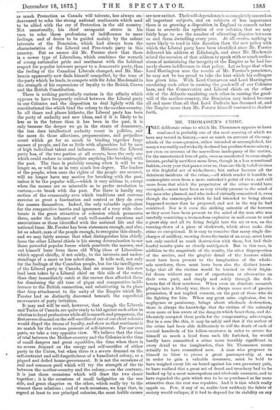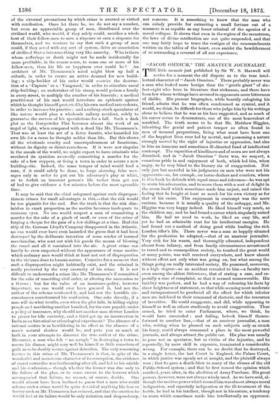MR. THOMASSEN'S CRIME.
THE deliberate crime to which Mr. Thomassen appears to have confessed is probably one of the most amazing of which we have any record in history,—not so much on account of the mag- nitude of the consequences, either intended or accomplished, for many a war rashly and wickedly declared has produced more misery ; nor even on account of the marvellous inadequacy of the motive, for the unrestrained love of gain, even as manifested in some single breasts, probably sacrifices more lives, though in a less sensational fashion, every year that passes over us, than are likely to fall victims to this frightful act of wickedness ; but rather because all the deterrent incidents of the crime,—all which render it horrible to contemplate even from a mere onlooker's point of view, and still more from that which the perpetrator of the crime would have occupied,—must have been so very vividly present to the mind of the man who planned, and who indeed virtually committed it, even though the catastrophe which he had intended to bring about happened sooner than he proposed, and not in the way he had contrived. Nor is it even the striking minutiae of the horrors as they must have been present to the mind of the man who was carefully contriving a tremendous explosion in mid-ocean to send a great ship and all its living freight into the air or sea, on the running-down of a piece of clockwork, which alone make this crime so exceptional. It is easy to conceive that many single dis- charges of artillery, mowing down the ranks of an anny, must have not only carried as much destruction with them, but had their fearful results quite as clearly anticipated. But in this case, in addition to the magnitude of the results, the utter disproportion of the motive, and the graphic detail of the horrors which must have been present to the imagination of the whole- sale murderer, there must have been also the distinct know- ledge that all the victims would be hurried to their fright.. ful doom without any sort of expectation or alternative on their own part, and simply and solely through the deli- berate fiat of their murderer. When even an absolute monarch plunges into a bloody war, there is always some sort of passive permission, if not implied consent, on the part of those who do the fighting for him. When any great mine explosion, due to negligence or parsimony, brings about wholesale destruction, there is always the knowledge that the victims of the calamity were more or less aware of the dangers which beset them, and de- liberately accepted these perils for the compensating advantages. But in a case like this, it may be safely said that if the author of the crime had been able deliberately to will the death of each of several hundreds of his fellow-creatures in order to secure for himself so much a head from each life forfeited, he would hardly have committed a crime more horribly significant in every detail to the imagination, than 3Ir. Thomassen seems actually to have committed now. A man who proposes to himself to blow to pieces a great passenger-ship at sea in order to gain a valuable insurance, must be held to have weighed every life on board against his own pecuniary gain, to have realised that a great act of fraud and treachery had to be backed up by a most unscrupulous and wholesale massacre, and to have regarded the gain which was to be so purchased as far more attractive than the cost was repulsive. And it is this which really appals us. Few, if any of us, realise how suddenly the fabric of society would collapse, if it had to depend for its stability on any
of the external precautions by which crime is averted or visited with retribution. Once let there be, we do not say a number, but even an appreciable group of men, distributed over the civilised world, who would, if they safely could, sacrifice a whole host of their fellow-men to save a sixpence or earn a sixpence for themselves, and we venture to say that such a group of men could, if they acted with any sort of system, drive an association of civilised States into something very like anarchy. Who is there whose sufferings or death might not be made incidentally far more profitable, in the coarse sense, to some one or more of his fellow-men, than his life or happiness ever could be ? An architect of Mr. Thomassen's mind might blow up half a suburb, in order to create an active demand for new build- ing; a ship-builder of his order would contrive the destruc- tion of a ' Captain' or a ' Vanguard,' in order to stimulate naval ship-building ; an undertaker of his stamp would poison a family in every street, to multiply the number of his funerals ; a medical practitioner of his cast would introduce an epidemic against which he thought himself protected by his own medical antecedents, in order to increase his practice ; and a railway-stock speculator of like nature would plan a wholesale railway accident, solely to guarantee the success of his speculations for a fall. Such a dark plot as the Gunpowder Plot becomes almost the work of an angel of light, when compared with a deed like Mr. Thomassen's. That was at least the act of a fierce fanatic, who hazarded his own life for a cause he thought nobler than life. But this shows all the wholesale cruelty and unscrupulousness of fanaticism, without its dignity or disinterestedness. If it were not singular in the annals of the world, we might expect to have criminals who emulated its cynicism avowedly committing a murder for the sake of a few coppers, or firing a town in order to secure a new building-site. Indeed, the same temper of mind would lead a man, if it could safely be done, to forge alarming false mes- sages only in order to put out his adversary's play at whist, or to forfeit an innocent person's life rather than get out of bed to give evidence a few minutes before the most agreeable time.
It may be said that the chief safeguard against such dispropor- tionate crimes for small advantages is this,—that the risk would be too gigantic for the end. But the truth is that the risk dim- inishes, in exact proportion as the motive becomes inadequate to common eyes. No one would suspect a man of committing a murder for the sake of a pinch of snuff, or even of the crime of forging a cheque for the gain of a few shillings at a time. Had this ship of the German Lloyd's'Company disappeared in the Atlantic, no one would ever have even hazarded the guess that it had been destroyed by the deliberate intention of some sender of insured merchandise, who sent out with his goods the means of blowing the vessel and all it contained into the air. A great crime can hardly be even suspected without the appearance of some motive which ordinary men would think at least not out of disproportion to the vio'ence done to human nature. Conceive for a moment that such a disproportion might habitually exist, and the criminal is really protected by the very enormity of his crime. It is not difficult to understand a crime like Mr. Thomassen's if committed for the sake of unsettling civil order, or altering the succession to a throne ; but for the value of an insurance-policy, however important, no one would ever have guessed it, had not the author of the scheme confessed it, and had not the horrible cir- cumstances corroborated his confession. One asks directly, if a man will do what results, even when the plot fails, in killing eighty people and mutilating another hundred, for the sum payable under a policy of insurance, why should not another man shatter London to pieces for idle curiosity, and a third get up an insurrection in India as an historical or ethnological experiment? The absence of a rational motive is as bewildering in its effect as the absence of a man's natural shadow would be, and puts you as much at fault in your attempts to discover the true author of the crime. Moreover, a man who felt " no scruple " in destroying a town to secure his dinner, might very well be himself so little conscious of guilt as to be doubly secure against detection. The only reassuring feature in this crime of Mr. Thomassen's is that, in spite of the wonderful and monstrous character of its conception, the evidence of moral cowardice was forthcoming after all, and led to his suicide and his confession,— though whether the former was due only to the failure of the plan, or to some extent to the horrors which accompanied that failure, we cannot, of course, decide. One would almost have been inclined to guess that a man who could scheme such a crime would be quite devoid of anything like fear or horror such as Mr. Thomassen has evinced, and that the emotion he would feel at its failure would be only irritation and despondency, not remorse. It is something to know that the man who 11 can calmly provide for extracting a small fortune out of a massacre is as capable as any lesser criminal of the agonies of a moral collapse. It shows that even in the region of the monstrous, i the laws of divine retribution are not quite suspended, and that one may fairly hope to trace the vestiges of the commandments written on the tables of the heart, even amidst the bewilderment of so astounding a reversal of all our experience.







































 Previous page
Previous page